The Shifting River Semuliki that is making Uganda smaller. WWF, TBG move to tackle unending questions.
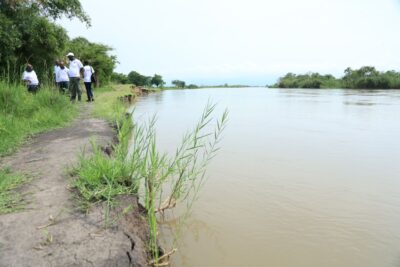 By Musa Polite
By Musa Polite
Mother nature has spoken on several occasions, people in different areas in Ntoroko district have now and again faced the challenge of flooding of the river Semuliki and lake Albert, in fact some schools and hospitals in Bwelamure sub county were forced to re located for close to year after river semuliki flooding and displacing them.
In May 2023, more than six hundred 600 people from at least ten villages in Ntoroko district were rendered homeless after river Semiliki burst its banks.
This is all because river Semuliki which originates from Lake Edward found in Kasese district of Western Uganda faces many threats due to an increasing population and poor governance of natural resources.
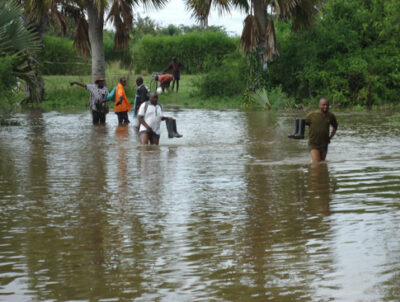 Locals maneuvering to cross a road that was blocked by the flooded river Semuliki in Rwebisengo town council, Ntoroko district
Locals maneuvering to cross a road that was blocked by the flooded river Semuliki in Rwebisengo town council, Ntoroko district
Apart from flooding, the shape of river Semuliki which separates Uganda and the Democratic Republic of the Congo has changed now and again. A look on the side of Uganda, the river keeps on extending its way through Uganda un like the side of Congo where there are trees, grass and papyrus that act as catchment of the river, preventing it from eating up its banks yet on the side of Uganda, the banks are bare, which gives the meandering river an advantage to.
’’The river is now half way bigger than how it was ten years back, because here on our side in Uganda, it doesn’t have anything to catch or stop it from cutting the edges. Am worried it will keep extending until it displaces villages.’’ Amon Magezi, one of the locals in Bwelamure Sub County was quoted saying.
The shifting river that is making Uganda smaller makes Local farmers lose out as increased flooding reroutes Semliki River and robs them of their land.
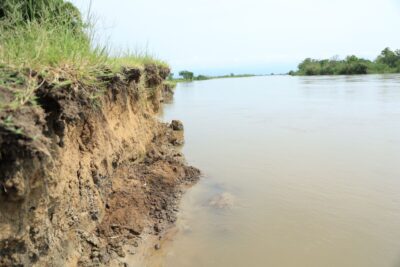 Image of eroded river Semuliki cliff on the side of Uganda.
Image of eroded river Semuliki cliff on the side of Uganda.
Kagaba Wilson looks across the 15 meters of swirling water to the opposite bank with a mixture of frustration, anger and defiance. He is angry because the river’s changing course has taken his land and delivered it to a man on the other side – a man who lives in another country.
“The land where our grandparents used to cultivate – it is now in Congo. It is now being controlled by the Congo government, ’The river has shifted almost a kilometer into Uganda due to continuous flooding and soil erosion in the area because it’s a basin ” says Kagaba, a farmer and cattle herder in Bweramule sub county.
In the same manner, Farmers in Rukora A and B in Bwelamure sub county Ntoroko district are desperate after River Semliki’s meandering reshaped the borders with Democratic Republic of Congo, leaving 23-acres of Rukora Island where they had planted their crops under the Congolese control.
Locals through Miss. Kemigisa Jane Nkojo, Female district Councilor Bweramule Sub County say it’s insecure for them to harvest their crops from the island because chief Rutahaba of Mitego, the nearlest chiefdom that boarders with Uganda has instructed his men to harass and arrest anyone found on the island from Uganda.
Though Retired Major Johns Mugabirwe the RDC of Ntoroko District asks locals to desist from forcefully going to the lost island as they engage King Rutahaba of Mitego, people are worried because they don’t know the fate of their crops and vegetables on the lost island.
Voice of the locals and the RDC on the lost island and what they intend to do
Additionally, river Semuliki, which acts as the only source of water for the people bordering The DRC is a life threat because despite people losing their lives through drowning into the river while fetching water, many people and animals like cattle, goats and sheep have been killed and eaten by crocodiles while doing human activities on the river banks. The water is also unsafe and contaminated because it’s shared amongst livestock and human.
The World Health Organization (WHO) estimates that every year, more than 3.4 million people die as a result of water-related diseases. In Uganda, it is estimated that about 89,000 cases and 3,000 deaths occur annually due to cholera
To save these and more challenges, Toro Botanical gardens has patterned with world wide fund for nature to plant trees and other catchment grass along the river banks to protect the river from extending its way, and set up a community water source which will save people from going to fetch the water from the river where they would find challenges.
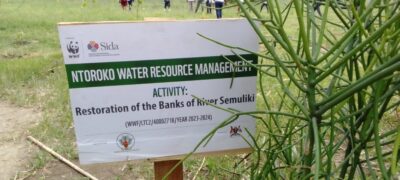
The exercise that has been commissioned after being put in place by Toro botanical Gardens with the 139 million support from world wide fund for nature saw planting trees to protect the buffer zone of river Semuliki and erecting of ten tap stands to give people clean water and protect locals from going to the River frequently where they would face off with crocodile, the exercise also has provided solar powered clean water for the animals to protect them from damaging the river and also keep them away from being eaten by the Crocodile
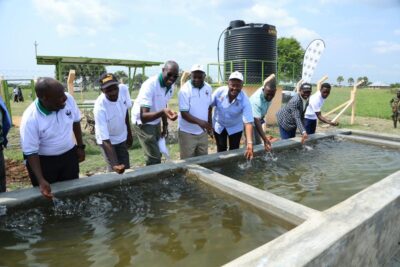 WWF country director, TBG executive director and Ntoroko district leaders launching the solar powered animal wells.
WWF country director, TBG executive director and Ntoroko district leaders launching the solar powered animal wells.
Ruyonga Godfrey, Executive director Toro botanical gardens says humans and their animals have been facing risks of crocodile eating them while the river on the Uganda side is at high speed of falling hence planting trees that can catch the river and deter it from further destruction.
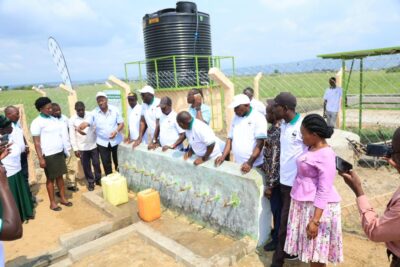
Some of the Tap stands that have been erected to help people from going to fetch from the river
Ruyonga says they have planted river friendly indigenous trees and fruit trees, these will bind together the soil and deter it from being taken by the meandering rice.
‘’we shall also plant grass on top of the natural grass that is regenerating with the guidance of our experts, we hope in the next one year, green and forest cover on the side of Uganda will be firm enough to reduce the level at which the river is eating up the side of Uganda’’ Ruyonga noted.
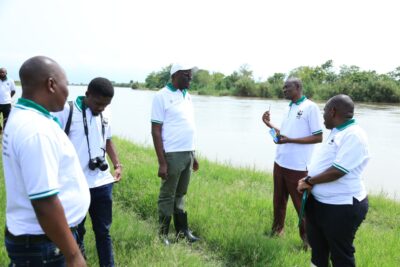 Ruyonga (right)leading team of officials from wwf on the edges of river Semuliki where TBG is planting trees
Ruyonga (right)leading team of officials from wwf on the edges of river Semuliki where TBG is planting trees
Country director world wide fund for nature Mr. Ivan Tumuhimbise says that as the organization, they emphasize better ways of people co existing with nature, that’s why they have supported different regenerative projects in different districts to help curb down the effect of climate change.
Mr. Tumuhimbise Applauded Ntoroko district for cooperation and asked them to put ways to protect the mechanized equipment so it may serve its purpose for long.
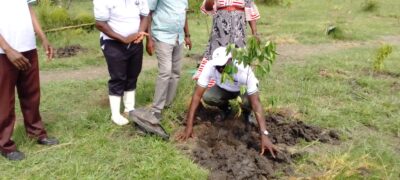
WWF Country director Mr.Tumuhimbise planting a tree in the buffer zone of river Semuliki during the launch
Rtd. Major Johns Mugabirwe, the Ntoroko district RDC says he is impressed by the work on ground because this will serve as a pilot project for other sub counties. He asked if they could cover more of the kilometers to sort river meandering that has started causing issues.
Ends


